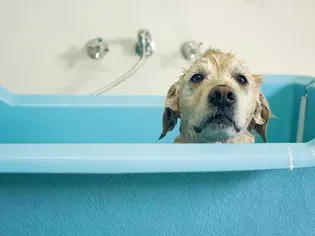Why Does My Dog Smell So Bad?
Updated on 04/26/24

Why Does My Dog Smell So Bad? A Comprehensive Guide to Canine Odor Control
As a dog owner, you want your furry friend to look and smell their best. Yet, sometimes you may find yourself puzzling over an unpleasant odor emanating from your beloved companion. Understanding the causes behind canine malodor is crucial for addressing the issue effectively and ensuring your dog's well-being. In this comprehensive guide, we delve into the myriad reasons why dogs smell bad, offering practical solutions to help you restore their fresh and fragrant scent.
1. Skin and Coat Issues
* Yeast and Bacterial Infections: Dogs with allergies or skin folds are prone to yeast and bacterial infections, which can lead to a musty or yeasty odor.
* Dermatitis: Skin inflammation caused by allergies, parasites, or other irritants can produce a foul smell.
* Seborrhea: This condition characterized by excessive oil production can lead to a greasy, rancid odor.
2. Anal Gland Problems
* Impacted Anal Glands: Dogs' anal glands typically release a pungent fluid to mark their territory. If these glands become impacted, the fluid can build up and produce a foul odor.
* Anal Fistula: A fistula is an abnormal opening between the anal glands and the skin, allowing fluid to leak and cause a bad smell.
3. Dental Issues
* Periodontal Disease: Bacteria buildup on teeth and gums can lead to gum infections and a foul odor from the mouth.
* Abscesses: Infected tooth roots or gums can create pus-filled abscesses, releasing an unpleasant odor.
4. Ear Infections
* Otitis Externa: Inflammation of the outer ear canal can cause a musty or yeasty odor, especially if accompanied by a discharge.
* Otitis Media: Infections of the middle ear can also produce a foul smell due to fluid accumulation.
5. Gastrointestinal Issues
* Upset Stomach: Vomiting or diarrhea can leave behind a strong odor on the dog's coat or in their breath.
* Food Intolerances or Allergies: Certain foods can trigger digestive problems and produce a foul-smelling gas.
* Parasites: Internal parasites, such as roundworms or hookworms, can cause gastrointestinal distress and a bad odor.
6. Other Medical Conditions
In rare cases, an underlying medical condition may be the cause of canine malodor:
* Diabetes: High blood sugar levels can lead to a fruity odor from the breath.
* Kidney Disease: Impaired kidney function can result in a urine-like smell from the breath and skin.
* Liver Disease: Liver problems can produce a musty or ammonia-like odor from the breath.
Solutions for Canine Odor Control
Once you have identified the underlying cause of your dog's bad smell, you can take appropriate steps to address the issue:
* Skin and Coat Issues: Maintain good hygiene by bathing your dog regularly with a specialized shampoo. Treat any infections with antibiotics or antifungal medications prescribed by your veterinarian.
* Anal Gland Problems: Express your dog's anal glands regularly to prevent impaction. Consult your veterinarian if you suspect a fistula or infection.
* Dental Issues: Brush your dog's teeth daily and schedule regular dental cleanings to remove plaque and tartar. Treat any infections or abscesses with antibiotics or extractions.
* Ear Infections: Clean your dog's ears regularly and treat any infections with prescribed ear drops.
* Gastrointestinal Issues: Feed your dog a high-quality diet and avoid table scraps that may trigger digestive problems. Deworm your dog regularly to prevent parasite infestations.
* Other Medical Conditions: If your dog exhibits any signs of underlying medical conditions, consult your veterinarian immediately for proper diagnosis and treatment.
Preventing Canine Odor
In addition to addressing underlying causes, implementing preventive measures can help keep your dog smelling fresh:
* Regular Grooming: Brush your dog's coat regularly to remove loose hair and debris.
* Bathing: Bathe your dog every 2-3 weeks or as directed by your veterinarian, using a shampoo specifically formulated for dogs.
* Dental Hygiene: Brush your dog's teeth daily and schedule regular dental cleanings.
* Ear Care: Clean your dog's ears regularly to prevent infections.
* Proper Diet: Feed your dog a high-quality diet and avoid table scraps that may trigger digestive problems.
* Regular Exercise: Exercise helps keep your dog healthy and prevents obesity, which can worsen skin and coat issues.
Additional Tips
* Use Dog Odor Neutralizers: Apply dog odor neutralizers to your dog's coat or surroundings to eliminate unpleasant smells.
* Ventilate Your Home: Ensure good ventilation in your home to reduce the accumulation of odors.
* Use Air Purifiers: Air purifiers can remove pet odors from the air.
* Consult Your Veterinarian: If you cannot identify the cause of your dog's bad smell or if home remedies are ineffective, consult your veterinarian for professional advice and treatment.
By understanding the causes of canine malodor and implementing effective solutions, you can help your beloved companion maintain a fresh and pleasant scent, ensuring both their well-being and your olfactory enjoyment. Remember to consult your veterinarian for any underlying medical conditions that may require professional care.
Explore More Pets

Basic Training
Puppy and Baby Introductions

Working Dog Breeds
All About Search and Rescue Dogs

Dog Treatments
Puppy Vaginitis: Signs, Causes and Treatment

Dog Adoption
After More Than 1,200 Days in the Shelter, Coco Goes Home

Basic Training
How to Train Your Puppy to Go on Potty Pads

Hybrid Dog Breeds
The Difference Between a Mutt, Mixed Breed, or Designer Dog?

Dog Treatments
Nail Problems in Dogs

Puppies
7 Reasons Why Two Dogs Are Better Than One